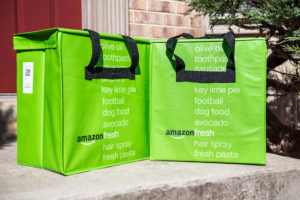In February of this year, Fast Company published Why Amazon is the World’s Most Innovative Company of 2017. This was months before the announcement of their $13.7 billion acquisition of Whole Foods.
 If we take a close look at Amazon’s success, we see that they are fully capitalizing on excellence in distribution. Their first market—books. Amazon created an online marketplace that enabled customers to buy new and used books and have them delivered. They added bookstore-like features such as being able to read excerpts online and share book info and reviews. Over time, personalized reading recommendations were proactively suggested based on purchase history. Then, technology evolved with tablets and phones, enabling e-books and instant delivery. Amazon developed its own winning product, the Kindle, which was and is generally cheaper than competitive alternatives. In physical delivery, there’s great interest in Amazon Prime Air, targeting 30-minute delivery by drones.
If we take a close look at Amazon’s success, we see that they are fully capitalizing on excellence in distribution. Their first market—books. Amazon created an online marketplace that enabled customers to buy new and used books and have them delivered. They added bookstore-like features such as being able to read excerpts online and share book info and reviews. Over time, personalized reading recommendations were proactively suggested based on purchase history. Then, technology evolved with tablets and phones, enabling e-books and instant delivery. Amazon developed its own winning product, the Kindle, which was and is generally cheaper than competitive alternatives. In physical delivery, there’s great interest in Amazon Prime Air, targeting 30-minute delivery by drones.
So when Amazon announced the Whole Foods acquisition, there was a shudder from everyone associated with the food industry. Most agree that this has been an extremely successful move, extending Amazon’s distribution prowess to another category. Sales of both entities have increased without cannibalization.
One of their first moves—reducing the price of more than 300 Whole Foods items. Herman Simon’s 9/12/17 HBR article asserts that Whole Foods’ 456 stores can function as a real-time pricing lab. Amazon Prime will be the rewards program for Whole Foods shoppers, and they will receive special discounts. Linking Whole Foods data to Prime data creates a massive pricing intelligence opportunity. The rapid expansion of Amazon Echo and Dot adds another dimension to ease of ordering and positions them well as IoT continues to evolve. There are currently over 80 million prime members, having increased from approximately 63 million in June 2016.
And then there’s technology for good. Amazon was selected to participate in a multi-year experiment, delivering food to people in the SNAP program. The Brookings Institute believes this has the potential to virtually eliminate food desserts and will force neighborhood grocers to elevate their quality.
Amazon is smart, aggressive, fast, and can course correct without seeming to miss a beat. They seem to take the air out of the markets they target. So how should businesses successfully co-exist with this Goliath?
One approach is to focus on customer intimacy as a strategic advantage. That means really understanding your customers. If you want them to stay married to you, you have to put effort into building the relationship. Learn who they are, what satisfies them emotionally, how to best communicate with them, and what triggers the behavior you want. It’s much more than price and aesthetics. Finding those things that make for a successful marriage is the space in which Breakthrough plays.





